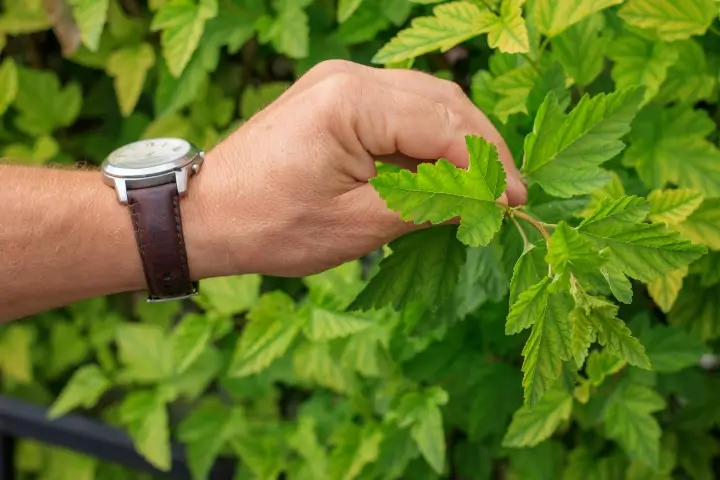
When your trees and plants thrive, your space feels more peaceful and joyful. Regularly checking their health ensures you can identify issues early, stopping bigger problems from developing. By staying proactive, you can help your plants flourish for years to come, enhancing the beauty and tranquility of your environment.
This informative guide offers expert advice from tree and plant care specialists on evaluating the health of your plants and trees, customized for the climate of the San Jose, CA area.
How to Check the Health of Your Trees and Shrubs
Trees and shrubs can show clear signs of health problems, often through distinct symptoms. While these signs may not always be alarming, they can suggest that a closer look is needed to uncover hidden issues:
- Leaf Discoloration: If leaves turn yellow, brown, or show spots during the growing season, it may indicate stress, nutrient shortages, or a potential infection affecting the tree or shrub.
- Dead or Dying Branches: Bare, peeling, or easily snapping branches are common signs of underlying problems, including disease or environmental stress impacting the tree or shrub’s health.
- Fungal Growth: The presence of mushrooms or fungi near or on a tree or shrub suggests internal decay, weakening the tree’s structure and posing a risk to its overall stability.
- Sparse Foliage: A thinning canopy compared to previous years could signal stress, disease, or root system problems, all of which can negatively affect a tree or shrub’s overall health.
- Insect Activity: Pests like aphids or beetles around a tree or shrub may indicate it’s weakened by disease or other issues, making it more susceptible to further infestations and damage.
- Cracks or Splits in the Trunk or Leaning: Visible cracks, splits, or leaning of a tree’s trunk often signal structural damage, typically caused by disease, which increases the risk of the tree falling or breaking.
Common Health Problems for Plants
Much like a cough can be linked to different health concerns, yellowing leaves can signal a range of issues. The key is to identify the symptoms and investigate further. Common causes of plant health problems are:
- Diseases: Fungal, bacterial, or viral infections can manifest through symptoms such as wilting, discoloration, and mold, which can severely damage the plant if not addressed.
- Soil Conditions: Poor drainage, compacted soil, or improper pH levels can interfere with root development, leading to poor nutrient uptake and affecting the overall health of the plant.
- Weather Extremes: Extreme weather, including drought, frost, and intense heat, can stress plants, stunting growth and reducing their capacity to recover and thrive.
- Pests: Insects like aphids, beetles, and caterpillars can damage plant parts, weakening the plant and making it more susceptible to diseases and other environmental challenges.
- Physical Damage: Injuries from lawn equipment, animals, or severe weather can harm plants, leaving them vulnerable to infection and further deterioration.
- Nutrient Deficiencies: Lack of key nutrients like nitrogen, potassium, or iron may not show immediate effects, but can cause stunted growth, weakened health, and long-term issues for the plant.
Need a Tree and Plant Healthcare Estimate?
Click below to leave your information and we will call you right back!
Ready to schedule your tree & plant care service?
Leave your information below and we will give you a call back.
*During normal business hours. After hours calls will be returned the next business day.
Specialized Plant Health Care for Extreme Weather
Trees and shrubs weakened by extended heat and drought become more vulnerable to wildfire risks, as their resilience is compromised. This ongoing strain leaves them less equipped to face further threats. Additionally, frost during the night can damage foliage, stifling growth and vitality.
Anderson’s Tree Care offers plant care specifically tailored to the unique climate of the San Jose, CA area. We provide year-round services to ensure your plants flourish no matter the season.
Questions About Your Plant’s Health in the San Jose, CA area?
Healthy plants elevate your home’s beauty and tranquility, purifying the air and enhancing the environment. They contribute to a calming atmosphere that nurtures both your well-being and the plants’ growth. Each time you look out the window, you create a peaceful sanctuary for yourself and your plants.
Need help with your plants in the San Jose, CA area? Anderson’s Tree Care is here to provide expert advice and solutions. Reach out to our certified arborists today!
Back to Tree and Plant HealthcareHow Do You Check the Health of a Plant in the San Jose Metro Area ?
Serving San Jose CA
San Jose | Fremont | Newark (CA) | Milpitas | Mountain View | Stanford | Palo Alto | East Palo Alto | Woodside | San Mateo | San Carlos
Redwood City | Los Gatos | Saratoga | Cupertino | Fruitdale | Campbell | Alamitos | Santa Clara | Coyote | Morgan Hill | San Martin | Gilroy
Home » Tree and Plant Healthcare » How Do You Check the Health of a Plant?



